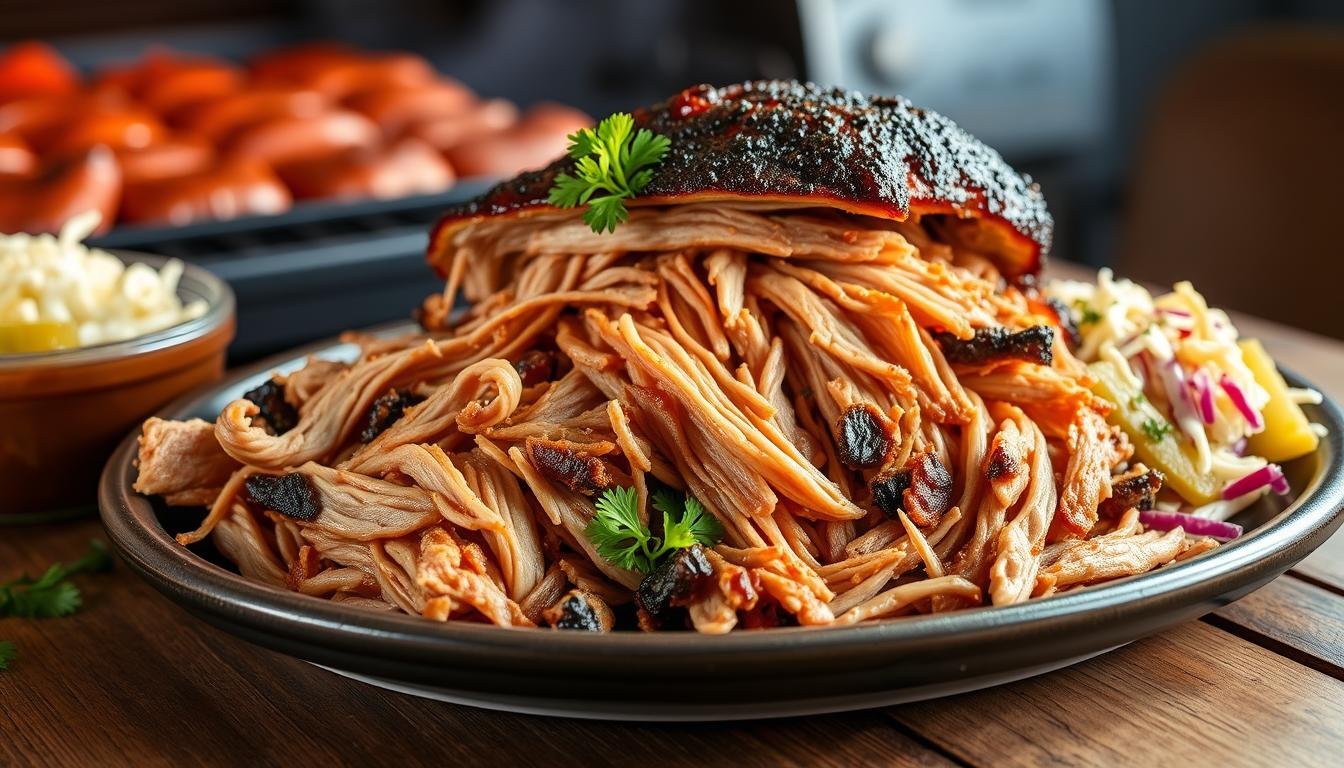As the sun sets, the smell of slow-smoked pork fills the air. It invites everyone to come together for a great barbecue. Whether you’re an expert or new to smoking, making Traeger pulled pork is a fun journey. We’ll show you how to make the most tender, flavorful barbecue pork you’ve ever had.
Imagine a juicy piece of pork that just melts in your mouth. Each bite is full of smoky, sweet, and savory flavors. With the right techniques and a Traeger wood pellet grill, you can create this magic. This recipe is perfect for any gathering or special meal.
Table of Contents
Understanding Pork Cuts for Smoking
Choosing the right pork cut is key to making delicious Traeger pulled pork. Pork butt and pork shoulder come from the same area but differ in taste and texture. Each cut has its own unique qualities that affect the final dish.
Difference Between Pork Butt and Shoulder
Pork butt, or Boston butt, is from the upper shoulder. It has more fat and marbling, making it perfect for tender pulled pork. On the other hand, pork shoulder, or picnic roast, is from the lower part. It’s chewier and better for slow-cooking methods like roasting or braising.
Choosing the Right Size
For smoking, choose a pork butt that’s 8-10 pounds. This size ensures enough meat for everyone and prevents it from drying out. Smaller cuts might not stay juicy during the long smoking time.
Fat Content and Marbling
Look for a pork butt with plenty of fat and marbling. This fat melts and bastes the meat, making it tender and juicy. The fat and connective tissue also help create the pulled pork texture.
“Pork butt is prized for its higher fat content and superior marbling, making it the ideal choice for achieving that tender, juicy pulled pork texture.”
| Pork Butt (Boston Butt) | Pork Shoulder (Picnic Roast) |
|---|---|
| Higher fat content and marbling | Leaner with less fat |
| Ideal for pulled pork | Better for roasting or braising |
| Longer cooking time (8-15 hours) | Shorter cooking time |
| Tender and juicy texture | Chewier texture |
Essential Equipment and Tools
Cooking a tasty Traeger pulled pork needs the right gear. You’ll need a top-notch pellet grill, a dependable meat thermometer, and an aluminum pan to catch drippings.
The Traeger Timberline 1300 is a great pellet grill. It has lots of space and controls temperature well. This ensures your pork is perfectly smoked and tender. A meat thermometer, like the Meater probe, is key. It lets you check the pork’s internal temperature, so it’s cooked just right.
To keep your Traeger clean and catch drippings, remove the top rack. Place a deep, half-size aluminum pan on the bottom rack. This makes cleanup easy and lets you baste your pork with tasty juices.
| Equipment | Key Features |
|---|---|
| Pellet Grill | Traeger Timberline 1300 with precise temperature control |
| Meat Thermometer | Meater probe for monitoring internal temperature |
| Aluminum Pan | Half-size, deep pan for catching drippings |
With these tools, you’re ready to make a delicious Traeger pulled pork. Your guests will love it. Let’s start smoking!
Perfect Traeger Pulled Pork Recipe
Take your barbecue to the next level with this Traeger Pulled Pork recipe. It’s smoky, tender, and full of flavor. Your guests will love it. Let’s explore how to make this tasty dish.
Ingredients List
- 10 lb pork butt
- BBQ rub (e.g., Heath Riles BBQ Garlic Jalapeño Rub and Sweet BBQ Rub)
- Tangy Vinegar BBQ Sauce
Seasoning and Rub Preparation
Start by making the rub, which gives your pork its flavor. Mix brown sugar, garlic powder, salt, paprika, chili powder, mustard powder, cumin, oregano, cayenne, and black pepper. Rub this all over the pork, making sure it’s evenly coated.
Optional Injection Recipe
For even more flavor, try an optional injection. Mix apple juice, water, sugar, salt, and Worcestershire sauce. Then, inject this mixture into the pork. It makes the meat juicy and full of flavor.
Now that your pork is prepped and seasoned, you’re ready to make a delicious Traeger Pulled Pork. Next, we’ll cover the smoking process to get that perfect smoky taste.
Preparing Your Pork for Smoking
Before starting your smoky BBQ adventure, it’s key to prepare your pork butt for the Traeger. This step is essential for tender, flavorful pulled pork.
First, trim the fat cap, leaving a thin layer. This fat will melt and flavor the meat. Then, make a pocket under the fat cap. This pocket helps the seasoning spread evenly.
Next, dry the pork with paper towels and add a thin honey layer. This helps the dry rub stick and caramelize. Coat all sides, including the pocket, with your favorite dry rub. The Pork & Poultry Rub from Traeger is a great choice for smoked pork.
| Pork Butt Preparation Tips |
|---|
|
With your pork butt prepped and seasoned, you’re set to fire up the Traeger. This step is crucial for delicious, tender pulled pork.

Smoking Temperature and Wood Selection
To make the perfect Traeger pulled pork, you need to master the smoking process. Keeping the right smoking temperature and choosing the best wood pellets is key. This ensures your pork butt is tender and full of flavor.
Best Wood Pellets for Pork
For smoking pork, a mix of charcoal and hardwood pellets is best. Start with Royal Oak 100% charcoal pellets and add apple wood or hickory wood pellets. These add a smoky flavor that pairs well with pork’s natural taste.
Temperature Control Tips
- Set your Traeger smoker to a consistent temperature of 275°F.
- Keep this temperature steady, adjusting pellet feed as needed for a smooth smoke.
- Have extra wood pellets ready, especially in cold weather, to keep the temperature stable.
Controlling the temperature is crucial for a perfect smoke ring and tender pulled pork. Follow these tips and try different wood blends to achieve BBQ greatness.
The Smoking Process Step by Step
Smoking the perfect Traeger pulled pork takes patience and detail. Start by placing the pork butt on your Traeger grill grates, fat cap up. This fat cap will baste the meat as it renders down.
Smoke the pork butt until it hits 155-160°F, which takes about 4.5 hours. Remember to spritz the meat with water every hour after the first. This keeps the meat moist and prevents drying out.
| Smoking Time | Internal Temperature | Action |
|---|---|---|
| 1st hour | – | No spritzing |
| After 1st hour | – | Spritz with water every hour |
| Total time | 155-160°F | Approximately 4.5 hours |
When the pork butt hits the right temperature, slather it with tangy vinegar-based BBQ sauce. Wrap it tightly in aluminum foil. Smoke until it reaches 203-204°F, adding another 3 hours or so.
Patience is key for tender and juicy Traeger pulled pork. Resist the urge to open the grill too often. This can mess with the smoking process and temperature. Just follow the time and temperature guidelines for the best results.

Understanding the Stall and Wrapping Techniques
When smoking pork butt, you might hit a snag called the “stall.” This happens when the meat’s internal temperature stops rising, usually between 150-160°F. It can last for hours. But don’t worry, it’s common, and you can get past it.
When to Wrap
Wrapping your pork butt, known as the “Texas Crutch,” can help skip the stall. Wrap it when the internal temperature hits 155-160°F. Before sealing, add a flavorful liquid like apple cider or a vinegar-based mop sauce. This will add moisture and taste to the meat.
Dealing with the Temperature Plateau
The temperature plateau can be tough, but you can beat it. Airflow, humidity, and meat density play a role in how long it lasts. Try using a water pan, raising the grill temperature, or cutting the meat into smaller pieces. These can help shorten the stall and get your pork butt cooking again.
It’s key to keep an eye on the grill and meat temperatures with a good digital thermometer. By understanding the stall and mastering wrapping, you’ll get your Traeger-smoked pork butt to be tender, juicy, and smoky.
| Technique | Impact on Stall |
|---|---|
| Wrapping in Foil (Texas Crutch) | Helps overcome the stall and retain moisture |
| Increasing Grill Temperature | Can shorten the stall period, but may impact texture |
| Using a Water Pan | Regulates humidity and slows evaporation, leading to a shorter stall |
| Separating Meat into Smaller Sections | Allows for better management of the stall individually |
By using these techniques, you can handle the pork butt stall with ease. You’ll get delicious, smoky pulled pork from your Traeger.
Making the Perfect Mop Sauce
Making the perfect mop sauce is key to delicious Traeger pulled pork. This basting liquid makes your meat moist and flavorful. It adds a tasty mix of seasonings.
The East Carolina mop sauce is a mix of white vinegar, cider vinegar, and water. It has brown sugar, smoky red pepper flakes, and Texas Pete hot sauce for sweetness and heat. Onion powder, garlic powder, dry mustard, kosher salt, paprika, and black pepper add depth to the sauce.
When your pork hits 170°F, it’s time to baste. Use the mop sauce every 30 minutes to keep the meat moist. This method is a North Carolina tradition, making your Traeger pork a true barbecue gem.
FAQ
What is the recommended size for a pork butt or shoulder?
What is the difference between pork butt and pork shoulder?
What essential equipment is needed for Traeger pulled pork?
What ingredients are needed for the seasoning rub and injection?
How long does it take to smoke a 10-pound pork butt on a Traeger grill?
When should you wrap the pork butt during the smoking process?
What is the purpose of the mop sauce, and how often should it be applied?
Source Links
- Smoke Pork Butt on the Traeger | Girl Carnivore – https://girlcarnivore.com/smoked-pulled-pork/
- How to Smoke a Pork Butt for Pulled Pork – Traeger Grills – https://www.traeger.com/learn/pulled-pork?srsltid=AfmBOooRVwjUowoIOH86iUg0A84eq47wZK9ve_YzXcLHVki5Y9iqfbEx
- Traeger Pulled Pork – https://jewcanque.com/pork/traeger-pulled-pork/
- Smoked Pulled Pork (Traeger Smoker) – Cook What You Love – https://cookwhatyoulove.com/smoked-pulled-pork/
- The Best And Worst Cut Of Pork To Smoke – Food Republic – https://www.foodrepublic.com/1644372/best-worst-cuts-pork-smoke/
- Easy, Juicy, And Succulent Traeger Pulled Pork Recipe – https://www.trendgredient.com/traeger-pulled-pork/
- Traeger Pulled Pork – Drizzle Me Skinny! – https://drizzlemeskinny.com/traeger-pulled-pork/
- Traeger Pulled Pork – Smoked Pulled Pork, Low Carb, Keto, Gluten-Free – https://agrillforallseasons.com/traeger-pulled-pork/
- Best Traeger Pulled Pork Recipe – Modern Harvest – https://modernharvest.ca/traeger-pulled-pork-recipe/
- Easy Pulled Pork Shoulder Recipe (Traeger Smoked) – https://sweetpealifestyle.com/easy-pulled-pork-shoulder/
- How to Smoke a Pork Butt for Pulled Pork – Traeger Grills – https://www.traeger.com/learn/pulled-pork?srsltid=AfmBOor33PSem5LPDLFCLReM0SrvDaUbRqKpFaYD1ESmw7Lu8MJY3nvB
- How to Make Competition Pulled Pork | Traeger Grills – https://www.traeger.com/learn/competition-pulled-pork?srsltid=AfmBOoqLTRdpE-Ie315pUIqQ9R7LIPPX2tRwM527yuGgnfOT5Xitrp5K
- How to Smoke a Pork Butt for Pulled Pork – Traeger Grills – https://www.traeger.com/learn/pulled-pork?srsltid=AfmBOoqUGScUmy-p7r1c5S6chMf2EAvdEkE3R64eVXe9YxkryWe9V-9S
- How to Make Competition Pulled Pork | Traeger Grills – https://www.traeger.com/learn/competition-pulled-pork?srsltid=AfmBOopjekfxo5fACVkL13EEBTpam1KNDPEFTUVwpHNcAjmWti5Wir6A
- How to Smoke a Pork Butt for Pulled Pork – Traeger Grills – https://www.traeger.com/learn/pulled-pork?srsltid=AfmBOorkuYC5bjYlNhbeOKNXSXH9qsTcQmVMoYbIMboi7Xby5q0KuiBZ
- Ultimate Smoked Pork Butt (Traeger Pulled Pork) | From Scratch Fast – https://fromscratchfast.com/traeger-smoked-pulled-pork-recipe/
- Easy Pulled Pork on the Traeger Timberline 1300 – https://www.heathrilesbbq.com/blogs/favorite-recipes/easy-pulled-pork-on-the-traeger-timberline-1300
- How to Smoke a Pork Butt for Pulled Pork – Traeger Grills – https://www.traeger.com/learn/pulled-pork?srsltid=AfmBOooNZAJoxC1f61UdnVa36VpH6Y-_vlysUwbo7lveiEtoReipse_4
- The Science of BBQ – The BBQ Stall | Napoleon – https://www.napoleon.com/en/us/grills/blog/science-bbq-bbq-stall
- When to Wrap for the Best Pulled Pork: How & Why – https://www.smokedbbqsource.com/when-to-wrap-pork-butt/
- East Carolina Mop Sauce Recipe – https://www.grillseeker.com/east-carolina-mop-sauce-recipe/
- North Carolina Style Pulled Pork – https://tarateaspoon.com/north-carolina-pulled-pork-recipe/

